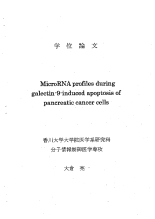MicroRNA profiles during galectin-9-induced apoptosis of pancreatic cancer cells
この論文にアクセスする
著者
書誌事項
- タイトル
-
MicroRNA profiles during galectin-9-induced apoptosis of pancreatic cancer cells
- 著者名
-
大倉, 亮一
- 学位授与大学
-
香川大学
- 取得学位
-
博士(医学)
- 学位授与番号
-
甲第641号
- 学位授与年月日
-
2016-06-28
注記・抄録
AbstractPancreatic cancer is the eighth‑leading cause of cancer‑associated mortality in males and the ninth‑leading cause in females worldwide. Even when diagnosed early enough to be potentially resectable, the prognosis of invasive pancreatic cancer is poor. Galectin‑9 (Gal‑9) is a tandem‑repeat type galectin that has recently been demonstrated to possess an anti‑proliferative effect on cancer cells. Therefore, the present study evaluated the effects of Gal‑9 on the proliferation of human pancreatic cancer cells and examined the microRNAs that are associated with the antitumor effects of Gal‑9. Gal‑9 suppressed the proliferation of multiple pancreatic cancer cell lines. In addition, Gal‑9 treatment increased the levels of caspase‑cleaved keratin 18 and the expression of cytochrome c in pancreatic cancer cell lines. This data suggests that Gal‑9 induces intrinsic apoptosis in pancreatic cancer cell lines through the caspase‑dependent and caspase‑independent pathways. In addition, Gal‑9 reduced the expression levels of phosphorylated epidermal growth factor receptor and numerous receptor tyrosine kinases (RTKs). In conclusion, Gal‑9 may suppress the growth of human pancreatic cancer cells in vitro. These findings suggest that Gal‑9 may be a new therapeutic agent for the treatment of pancreatic cancer.
Abstract Pancreatic cancer is the eighth‑leading cause of cancer‑associated mortality in males and the ninth‑leading cause in females worldwide. Even when diagnosed early enough to be potentially resectable, the prognosis of invasive pancreatic cancer is poor. Galectin‑9 (Gal‑9) is a tandem‑repeat type galectin that has recently been demonstrated to possess an anti‑proliferative effect on cancer cells. Therefore, the present study evaluated the effects of Gal‑9 on the proliferation of human pancreatic cancer cells and examined the microRNAs that are associated with the antitumor effects of Gal‑9. Gal‑9 suppressed the proliferation of multiple pancreatic cancer cell lines. In addition, Gal‑9 treatment increased the levels of caspase‑cleaved keratin 18 and the expression of cytochrome c in pancreatic cancer cell lines. This data suggests that Gal‑9 induces intrinsic apoptosis in pancreatic cancer cell lines through the caspase‑dependent and caspase‑independent pathways. In addition, Gal‑9 reduced the expression levels of phosphorylated epidermal growth factor receptor and numerous receptor tyrosine kinases (RTKs). In conclusion, Gal‑9 may suppress the growth of human pancreatic cancer cells in vitro. These findings suggest that Gal‑9 may be a new therapeutic agent for the treatment of pancreatic cancer.
目次
- 2019-09-04 再収集 (4コマ目)
